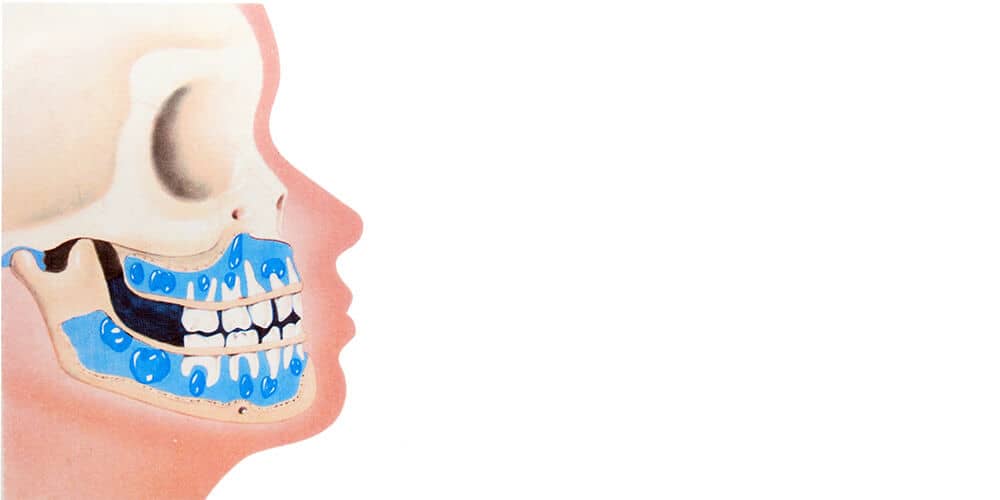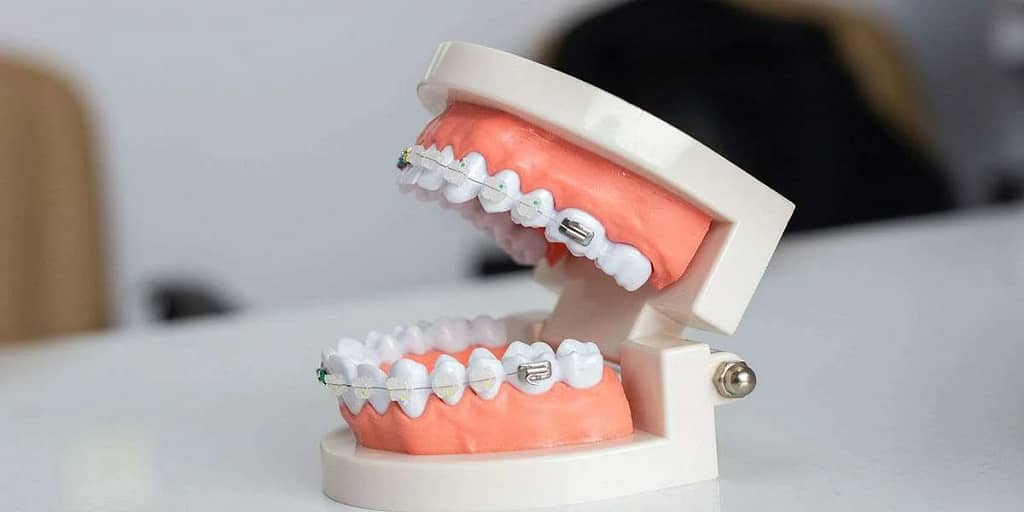The temporomandibular joint (TMJ), a joint in your jaw, functions as a hinge connecting your skull to your jaw in a sliding action. A little disc located inside the joint absorbs shock and keeps things flowing smoothly. You have temporomandibular disorder (TMJD), often known as TMJ, if and when something is wrong with the muscles, discs, or bones.
Why Does TMJ Dental Syndrome Occur?
This disorder affects patients for a variety of causes. TMJ can be caused due to various reasons like injury, rheumatoid arthritis, infection, misalignment, or bruxism. The following are some of the typical ones:
Dental trauma – a hard blow to the mouth can fracture your teeth as well as cause TMJ dysfunction.
Bruxism – Excessive teeth grinding is a disorder known as bruxism, which is more common in children and teenagers. While harmful oral habits should eventually go away in youngsters, this is not always the case.
Facial clenching – Overly clenching your face puts undue tension on facial muscles, which can irritate the joints in your jaw. Only tension, fear, and despair can cause face clenching.
Other medical disorders – TMD can be a symptom of arthritis. Rheumatoid arthritis and osteoarthritis are two types of arthritis that can result in TMD.
Symptoms Of TMJ disorder
Recognizing the symptoms can be challenging because they might vary depending on what is causing your TMJ, and the proper therapy depends on a precise diagnosis.
You would know exactly what is triggering your TMJ if you received a blow to the face and then started experiencing jaw pain. Some cases are brought on by arthritis that slowly erodes the cartilage in your jaw joint. Another possibility is that the disc has shifted, you have an infection, or you clench or grind your teeth as you sleep. Any of these may result in TMJ and the symptoms listed below:
Direct Pain On Your Jaw
If you find yourself reaching up to touch or lightly rub your jaw because it hurts or feels tender, it could be an indication of moderate TMJ. Some patients compare the discomfort to a deep bruise or a dull pain.
Attributed Pain
TMJ pain can occasionally manifest in areas other than your jaw. TMJ can also be the cause of general aches in your cheeks, neck, and ears.
Headaches
When you have TMJ, the muscles that run alongside your jaw tighten, causing pain that can radiate to your temples and cause a TMJ headache.
Chewing Problems
If tissues are damaged inside your joint, simple tasks you take for granted, including talking and eating, become challenging to complete. In addition to discomfort when chewing or moving your jaw, you could also have joint stiffness that makes movement difficult.
In severe circumstances, TMJ can even result in jaw locking, making it impossible for you to open or close your mouth.
Noises
A sound jaw indicates good health. You probably have TMJ if you notice sounds while you chew or speak, such as clicking, popping, or grinding.
TMJ Dentists
You might have a TMJ condition if you notice any stiffness, popping, clicking, or pain when opening or closing your mouth. Oral & Maxillofacial Surgery NYC for a complete diagnosis, advice on how to manage dysfunction caused by this issue, and relief of the pain. The oral and maxillofacial surgeons can evaluate your problem and suggest the best course of action as qualified and experienced healthcare experts.
Your lower jaw may move from side to side and open and close on either side of your head, just below your ears, thanks to a complicated network of muscles and joints. The temporomandibular joint, often known as the TMJ, is crucial to your capacity to chew, swallow, and talk. TMJ disorders are any issues that affect this joint and result in pain or restrict its motion.
You can have frequent headaches, facial pain, and earaches if you have a TMJ issue. This condition’s symptoms can also show up in different ways. For a thorough evaluation and treatment, it is imperative to see our oral and maxillofacial surgeon.
The oral and maxillofacial surgeon or dentists will thoroughly examine your face and jaws to identify the precise, underlying cause of your TMJ jaw-joint issue. They will suggest you an effective course of treatment.
A custom-fit night guard, bite changes, orthodontics, prosthodontics, or surgery are some of the treatment options for TMJ issues.
How To Treat TMJ Disorder?
The cause of your TMJ will determine the best course of treatment. Ibuprofen and other over-the-counter anti-inflammatory drugs can often be used in conjunction with a break from tough or chewy foods to reduce discomfort. Ice packs can also be used to lessen discomfort and swelling.
If your TMJ is brought on because of teeth grinding or nail biting, seeking counseling to understand the root of these behaviors is beneficial. Once you cease, your discomfort ought to disappear as well. In the interim, we can help you get fitted for a mouth guard to wear at night while you sleep in order to reduce pain, absorb shock, and protect your teeth.
Another strategy for treating TMJ disorder is to lessen stress in your life. Teeth clenching and tense muscles brought on by high levels of stress can both result in painful episodes.
If making these lifestyle adjustments doesn’t help, we might advise getting a Botox injection. This will help you to relax the muscles in and around your joints.
If none of these therapies work effectively for your jaw TMJ disorders, you might be a suitable candidate for surgery to undo the harm that’s causing your chronic discomfort.
Make an appointment with your New York City dentist location by phone or online. If you have any symptoms related to TMJ, visit your dentist to know the best TMJ disorder treatment.
Conclusion
Many dentists have received training in TMJ conservative treatments such as bite plates and night guards. If a patient’s condition needs additional care, dentists may refer you to an oral and maxillofacial surgeon or other healthcare providers. Specifically, if patients aren’t getting better while receiving physical therapy, bite plates, or both.



